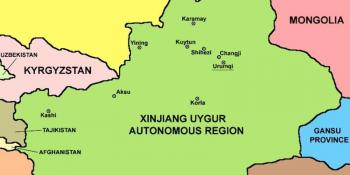When the Government Defines You: China and the Uyghurs

DATE AND TIME
Thu, May 10, 2018
6:30 PM – 8:00 PM EDT
LOCATION
One Judiciary Square, Government of the District of Columbia
441 4th Street, NW, 11th Floor
Room 1107
Washington, D.C 20001
DESCRIPTION
Please join the Forum on International Affairs and the Uyghur Human Rights Project for a discussion about the history and culture of the Uyghurs and an examination of the repression faced by Uyghurs in China.
The human rights situation facing Uyghurs living in what is officially named the Xinjiang Uyghur Autonomous Region, but at other times called East Turkestan, is becoming increasingly dire. The Xi Jinping era has brought about a draconian level of surveillance and mass, arbitrary detentions that are reminiscent of the Cultural Revolution but with better technology.
As an ethnic and religious minority within China’s portion of Muslim Central Asia, Uyghurs have a distinct Turkic language and culture from the rest of China. During the warlord era of the Republic of China and the ensuing Chinese Civil War, Uyghurs were subjected to political intrigue pursued by the former Soviet Union and various Chinese authorities. The Chinese Communist Party has responded to many expressions of Uyghur identity as a security threat requiring severe repression. This level of heightened attention from Beijing is not expected to abate now that the Chinese government has identified the region as a gateway for the “one belt, one road” initiative.
Guest Speaker:
Nicole Morgret, Project Coordinator for the Uyghur Human Rights Project
References:
Uighurs and China’s Xinjiang Region
What It’s Like to Live in a Surveillance State
China’s Prescription for Troubled Xinjiang: The New Silk Road
Discussion Questions:
1. How is Uyghur identity defined?
2. What are the sources of China’s security concerns and repression in Xinjiang?
3. What is nature of relations between nearby Uyghur populations in neighboring states of Kyrgyzstan, Tajikistan, and the disputed Kashmir region?
4. How does the plight of the ethnic Uyghurs compare to ethnic Kazakhs living in Xinjiang?
5. How does the diaspora community compare to those who chose to stay? Do they face similar risks?
6. Why is the term “cultural genocide” often mentioned regarding Uyghur culture and traditions?
7. Is there a constructive role for other countries and NGOs to address the human rights situation facing Uyghurs?
Program Note: This event is off the record and please bring photo I.D. for the venue’s security desk.
